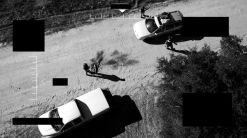On the weekend of 2nd – 4th November I went to Brighton, to see the Brighton Photo Biennial and to take part in the OCA study visit. Titled “Agents of Change: Photography and the Politics of Space“, this was the fifth biennial to be held in Brighton.
I arrived a day early so that I could explore Brighton and the biennial a bit before the official study visit. This blog post discusses the theme of the biennial, the next post will cover the study visit itself and the exhibits that I went to see.
From the press release:
BPB12 looks at how space is constructed, controlled and contested, how photography is implicated in these processes and the tensions and possibilities this dialogue involves.
Their intention is to make you think about and question the space that surrounds us and how it’s used.
It was a theme that I personally found very exciting and intriguing. I’ve been very interested in the erosion of public spaces ever since reading Lessig’s book “The Future of Ideas“. Where he discusses the tragedy of the commons in part one, before moving onto discussing a purely digital commons. I’m interested in privacy and freedom and the intersection with technological change. So, with BPB’s acknowledgement and inclusion of digital technologies though out the biennial, I thought I would be able to relate to the theme well.

Omer Fast, from 5000 Feet is the Best, digital film, 30 minute loop, still by Yonn Thomas, 2011. Courtesy of the artist, Arratia, Beer, Berlin, and gb agency, Paris, © Omer Fast
A few weeks ago, I went to a showing of a documentary film, called “The Real Social Network”. This followed the Occupy protest at University College London in 2010-2011. Intertwined with personal narratives about young people discovering themselves and finding a purpose, there was a larger discussion about identity and the architecture of fear built into our society.
It was fascinating to see how the protest movement used space, particularly with the reclaiming of public (or semi-public) space into a commons. It was good to see technology being embraced and used to support the creation of an adaptive hybrid-organisation (there was no formal structure), and to further the protests and reclamation of space. It’s clear that the biennial was influenced by Occupy and similar movements, and was keen to question their techniques and their impact.
I think it’s good that the organisers have embraced the politics of the idea and created a huge event that’s interesting, challenging and particularly relevant for now.
The BPB said they were concerned with:
the possibilities of photography as both a tool and a process: a means of understanding the world, and an active force in shaping it.
This is something that particularly interests me at the moment, as I move from looking at photographs purely because they look ‘pretty’ to having a deeper, more questioning viewpoint.
I like that the photographs we saw had a purpose and a meaning. I want to think that they made a difference, either to the people involved, like with the No Olho da Rua project, or to the people who viewed them by highlighting issues that would otherwise be overlooked.
I especially liked the way the biennial explored different methods of presenting and displaying works. I liked the variety of venues, outdoors and inside. Pubs, libraries, a public square, the university, shops all became part of the event and I felt this made the works more accessible and inclusive, than if they had chosen a select few galleries. The organisers were exploring the use of space as much as the exhibits themselves were and it meant the biennial became a part of the city for a few weeks.

Outdoor Space – The Old Pier
An experiment with long exposure, taken during a spare few minutes between events
Peer Reviews
- Dave Bartlett
- Byker: Day One and Day Two
- ProffStoff
- Eric’s blog
If I’ve missed any other reviews, please let me know in the comments.
Images posted, with the exception of my own, are used with the kind permission of Photoworks and Brighton Photo Biennial 2012



Thanks for sharing this… it is so frustrating to live abroad sometimes, I would love to share those study visits with you all…
Stephanie
(http://stephaniedhlearninglog.wordpress.com/)
Hi Stephanie.
I’m glad the post was of some use to you. The biennial was really good to visit in general, but yes, the study visit with other students and the tutors was a great experience. It’s possible to get loads from the course without the study visits, but I think experiences like these really help.
Keep an eye out for future visits, it’s possible there might be one further afield that you can attend.. Also, Is it possible for you to meet up with other photographers in your area? It’s not quite the same, but it might still be very worthwhile.
[…] previous blog post discusses the theme of the visit, with some background information, whereas this post covers the […]